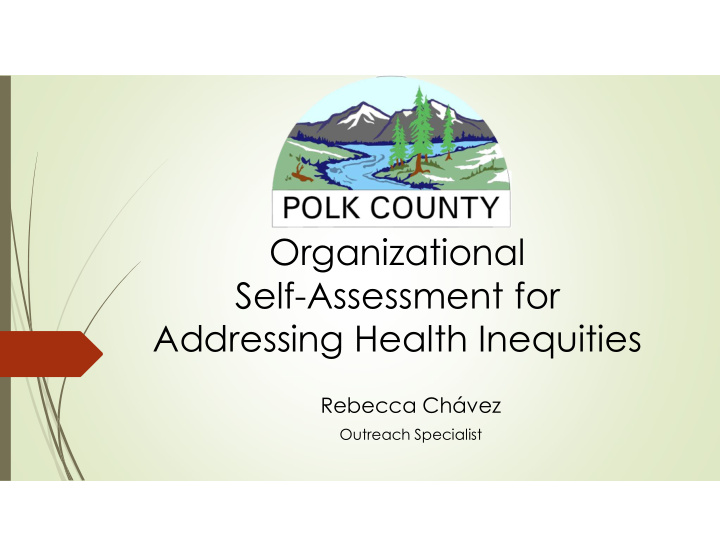



Organizational Self-Assessment for Addressing Health Inequities Rebecca Chávez Outreach Specialist
BARHII Toolkit Looks at Local Health Department (LHD) to build greater capacity to address health inequities Creates the initial dialogue between senior managers and staff in LHD to re-examine their collective understanding and ability to address the underlying causes of health inequities Self-assessment included: Anonymous Staff Survey via Survey Monkey Anonymous Collaborating Partner Survey Via Survey Monkey Staff Focus Group Management Interviews Internal Document Review and Discussion
Goals Short Term Long Term Collect data to identify skills and Incorporate equity in all aspects of capacities of LHD ability (both Polk County P&P, programs, organizational and individual) to outreach events, strategic planning address health inequities and workforce training Gain knowledge of where PCPH To be a role model and provide currently stands in organizational support for county departments to characteristics and workforce address inequities competencies internally and Continue to implement internal externally changes that address barriers to Create priorities of implementation services that address equity internally
Modifications to the BARHII TOOLKIT Staff survey Provided a greater in-depth glossary list of equity vocabulary Made staff time available for staff to take survey Removed strategic planning portion of survey Collaborating Partner Survey Provided a greater in-depth glossary list of equity vocabulary Management Interview Structured to be a focus group instead of individual interviews
Areas of Success Had a 100% success rate of staff participation in online staff survey (13/13) 15 collaborating partners participated in our online partner survey Conducted a successful staff focus group (4) to gain a better insight on staff responses from survey Conducted a successful management focus group with 1 county commissioner to gain knowledge about their awareness regarding equity Screened all series of unnatural causes and facilitated conversations among the various topics to all PH staff Collaborated in presenting a culturally responsive training to all health and human services staff
Considerations/Issues/Obstacles Conflicting obligations (other job related priorities) Lack of opportunities around the topic of health inequities Safe space and uncomfortableness Personal bias Lack of knowledge of what are health inequities/terminology Time Shortage of staff and resources
Moving Forward PCPH equity implementation team will prioritize strategies to address health inequities internally Some areas include: Workforce development Communication Improvement Structural changes Building capacity internally
Special Thanks… Jacqui Beal, Polk County Public Health, CHN Supervisor Katrina Rothenberger, Polk County Public Health, Administrator Rebecca Knight , Polk County Public Health, Health Educator Wendy Morgan, Maternal and Child Health , Oregon Health Authority Wendy Zieker, Marion County Health & Human Services, Program Manager Polk County Public Health Staff & Community Partners Developing Equity Leadership Through Training and Action (DELTA) Program Rebecca Chávez Outreach Specialist Polk County Public Health 503-623-8175 x 2405 Chavez.Rebecca@co.polk.or.us
Recommend
More recommend